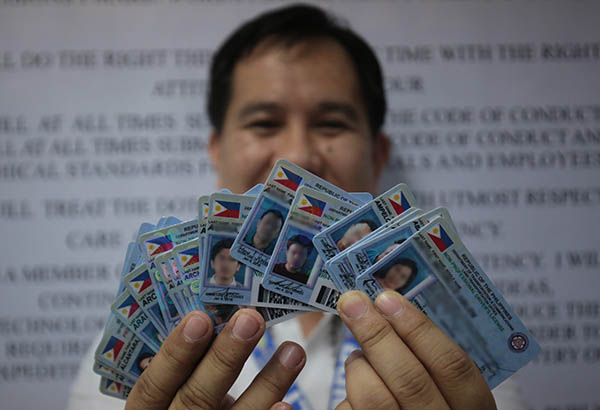Bicam OKs 5-10 year validity for driver’s license

The bicameral conference committee tasked to reconcile the conflicting versions of the bills approved by the Senate and House of Representatives met yesterday and came up with a unified version that was ratified by the respective chambers in plenary. File
MANILA, Philippines - Congress has approved the bill extending the validity of driver’s licenses from the current three years to a minimum of five and maximum of 10 years.
The bicameral conference committee tasked to reconcile the conflicting versions of the bills approved by the Senate and House of Representatives met yesterday and came up with a unified version that was ratified by the respective chambers in plenary.
The bill, which seeks to amend Section 23 of Republic Act 4136, as amended by Batas Pambansa Blg. 398 and Executive Order 1011 or the Land Transportation and Traffic Code, would now be transmitted to President Duterte for signing.
Once enacted, all driver’s licenses will be valid for five years, unless revoked or suspended. If during the five-year period the driver has not committed any traffic violation, then he or she is entitled to a renewal of the license for 10 years, “subject to the restrictions as may be imposed” by the Land Transportation Office (LTO).
The members of the Senate in the bicameral conference meeting emphasized that the LTO should not raise the cost of the application or renewal of driver’s licenses to recoup the foregone revenues from the extension of the validity of the licenses.
Under the bill, the cost of the licenses should be no more than “the government’s procurement expense.”
The LTO said there are an estimated four million driver’s license applicants annually, which provides them P1.8 billion in revenues.
Senate President Pro Tempore Ralph Recto, one of the principal authors of the law, said the LTO is not a revenue-generating agency but a service provider so it should not be focused on making money from the processing of driver’s licenses.
Sen. Grace Poe, chairperson of the Senate public services committee and principal sponsor of the bill, said the measure is intended to curb corruption and ease the burden of motorists who have to line up at the LTO offices every three years to renew their licenses.
Depending on where they renew their licenses, the process could take as little as half an hour or as long as a half day to complete.
To make the renewal of licenses convenient for the drivers, the bill also requires the LTO to create an online process within a year from effectivity of the law.
This means that drivers would no longer have to go to LTO offices to renew their licenses.
As introduced by the House, both panels agreed to impose a fine of P20,000 for willful misrepresentation of applicants, connivance with the officer, falsification of documents and cheating during examinations. Violators will also be prohibited from applying for a period of two years.
Under the measure, a license will be revoked for four years in case a driver gets involved in the death during an accident or physical injuries resulting in the loss of any part of the victim’s body, insanity, imbecility, impotence or blindness or incapacity to work.
Any LTO officer who issues a driver’s license without the necessary examinations, connives with the applicant for the irregular issuance of a license or who by gross negligence, issues a license to an unqualified applicant will be removed from the service and imposed the appropriate penalties.
As this developed, the Philippine Road Board is pushing for the LTO modernization and implementation of online car registration to simplify the process and allow faster release of funds to rehabilitate and maintain roads.
In a statement yesterday, the Road Board said LTO automation would reduce red tape and expedite transaction with the agency.
Online car registration is also expected to make the process easier for car owners as the public spends an average of two to four hours to register a motor vehicle.
The Road Board’s primary mandate is to manage and use special funds allocated for road, bridge and drainage maintenance and improvement, as well as installation of traffic lights and safety devices.
The special funds used by the Road Board come from the Motor Vehicle User’s Charge (MVUC) collected from owners of motor vehicles when they register their cars.
The LTO remits the MVUC to the Bureau of Treasury, which in turn deposits the revenues in four special trust accounts provided by law.
The Road Board collects about P1 billion per month from the LTO.
“Right now, we have three-month delay in collection of funds because the actual deposit is done manually,” Jose Antonio Aguas, chief of staff and head of operations of the Road Board said.
Earlier, Sen. Joseph Victor Ejercito filed a resolution urging the Department of Transportation to implement online registration for motor vehicles.
- Latest
- Trending


























